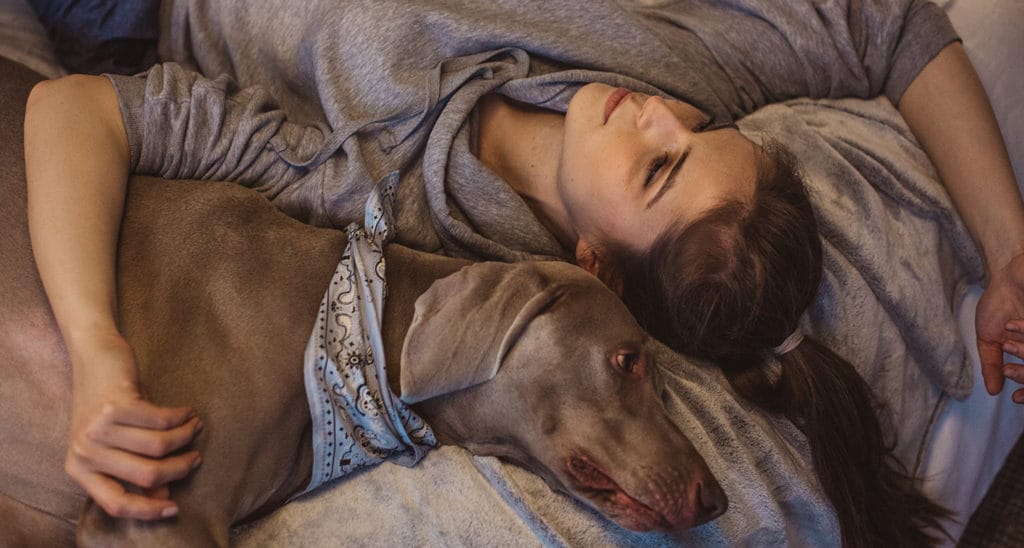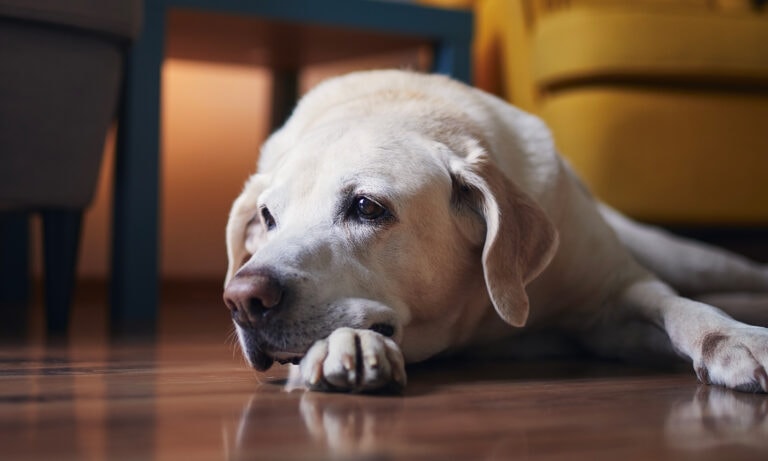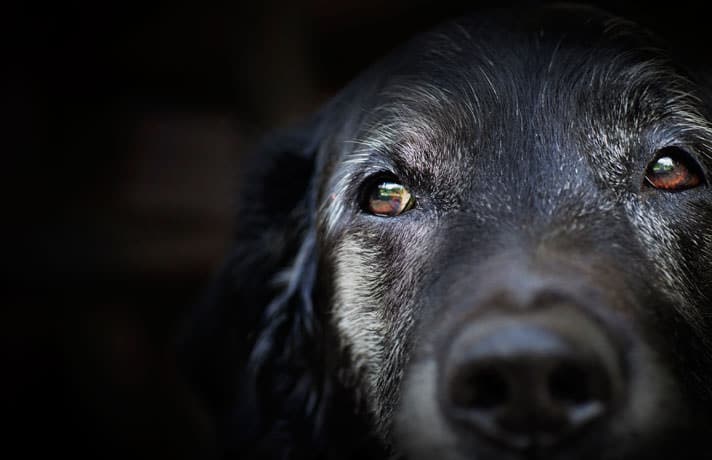Have you discovered that when it comes to bedtime, you’re far more dog-tired than your dog? If your old dog won’t sleep at night, it may be indicative of some underlying health problems.
The good news is that there are solutions that can help some senior dogs get the rest they need.
“All dogs, but especially senior dogs who experience a change in sleep behavior, specifically waking up at night, should be examined by their veterinarian sooner rather than later,” says Janet Tobiassen Crosby, DVM, formerly the vet medicine guide for About.com. “I would check in with your vet after a night or two of disrupted sleep, depending on how upset your dog is and other signs seen.”
Why an Old Dog Won’t Sleep at Night
“Sleep disruptions can be from a variety of causes, often medical in nature,” Dr. Crosby says. “Causes range from gastrointestinal trouble to urinary system infection to early stages of dementia.” Speak with your veterinarian if your pet is suffering from sleep disruption.
Nicholas Dodman, BVMS, MRCVS, DACVB, section head and program director of the Animal Behavior Department of Clinical Sciences at the Cummings Veterinary Medical Center at Tufts University in North Grafton, Massachusetts, distills the potential medical issues further into two categories:
- Canine cognitive dysfunction (CCD), also commonly known as canine Alzheimer's or dementia
- Pain
Dementia as a Cause of Dog Insomnia
“Just like people, as dogs get older there is an increasing frequency [of dementia],” Dr. Dodman says.
Because there’s no test for CCD, diagnosis can be tricky. Essentially, it’s a diagnosis of exclusion when other causes have been ruled out, Dr. Dodman says.
A trip to your veterinarian can help determine the cause of your dog’s insomnia and rule out others. This is often accomplished through performing a physical examination, blood work, and a urinalysis, Dr. Crosby says. After those tests have been completed, your vet may recommend more extensive testing.
“You don’t do a bone scan or MRI willy nilly—only after standard tests have been done,” Dr. Dodman says. Your veterinarian will determine which tests are appropriate for your pet.
Symptoms of canine Alzheimer’s, or senility, that affect sleep include restlessness, disorientation, and confusion. And there may be indicators during the day, too, including house soiling, increased anxiety, reduced appetite, weight loss, and lack of energy.
If a dog does have CCD, pet parents can help improve their dog’s quality of life with diet, medication, supplements, and cognitive enrichments. Unfortunately, there is no cure to CCD, which is one of the parallels to human Alzheimer’s.
Pain as a Cause of Dog Insomnia
Another possible reason for why a senior dog is restless at night is arthritis and pain, especially due to cancer in dogs, which Dr. Dodman says is the most common cause of death in older dogs.
“Tumors swell and grow and push things around,” Dr. Dodman explains.
And if a dog is in pain, that pain can be worse at night because there are no distractions, Dr. Dodman says.
Dogs who cannot sleep at night because of fear and anxiety may display signs like enlarged pupils, whale eye (where the whites of the dog’s eyes are visible), tucked tails, and drooling.
Sleeplessness may also be caused by seizures in dogs. “Seizures are not as well suppressed as they are during the day, and are especially common in old dogs,” Dr. Dodman says.
Environmental Causes for Dog Insomnia
Any change in an adult dog’s behavior is cause for concern, says Pat Miller, CBCC-KA, CPDT-KA, director of Peaceable Paws Dog and Puppy Training in Fairplay, Maryland, and should be discussed with a veterinarian. But sometimes, instead of a medical cause for dog insomnia, there could be external factors causing the sleeplessness that can be easily resolved.
If your senior dog is restless at night, consider any external changes that have occurred, including:
- Changes in the household routine
- New noises outside that may be disturbing your dog
- New household members
- Reduction in your dog's daily exercise/activity level
Those new noises may be seasonal. For example, a loud snowplow can affect your canine’s ability to sleep and lead to your old dog pacing at night, says Dr. Dodman. Another dog was disturbed when their house’s heating system kicked in, causing sleep issues, Dr. Dodman also recalls.
Dog Sleep Apnea and Dog Nightmares
Dog Sleep Apnea
People who suffer from sleep apnea may be inclined to think that their older dog with sleep issues has dog sleep apnea. But this may prove not to be the issue.
Sleep apnea doesn’t necessarily occur in older dogs, but it does with brachycephalic dogs—that is, dog breeds with flat faces, like Pugs and Shih Tzus—especially if they’re overweight, Dr. Dodman says. Possible signs of sleep apnea in dogs include snoring, suddenly waking up to gasp for air, and daytime fatigue.
Dog Nightmares
Something else that can affect a dog’s sleep at any age is nightmares. Dr. Dodman says electroencephalograms (EEGs) demonstrate brainwave activity increases during rapid eye movement (REM) sleep, the dreaming phase of sleep.
Dogs with the condition REM behavior disorder (RBD) physically act out what’s going on, instead of dreaming quietly, displaying the symptoms you would expect of a nightmare. Behaviors typically seen with REM sleep behavior disorders include sudden leg movements, growling, barking, and biting.
If you notice your dog having nightmares regularly, the Cummings School of Veterinary Medicine at Tufts University recommends speaking with a veterinarian and behaviorist to determine and address the root cause of the nightmares. It’s important to have a veterinarian rule out seizures because signs can look similar.
Treatments for Dog Insomnia
Once you determine why your old dog won’t sleep at night, you can begin exploring possible treatments with your veterinarian. Treatments and approaches to help dog insomnia may include:
Prescription Treatments
As an example, your vet may prescribe Anipryl® (selegiline hydrochloride tablets) for a dog with CCD. Other prescriptions for CCD include Aricept® and Namenda®.
Aricept® and Namenda® are currently not FDA-approved as veterinary medications, but veterinarians can prescribe certain human drugs in animals in certain circumstances. This is called extra-label or off-label use because this use isn’t described on the drug label. Your veterinarian will determine whether this medication is right for your pet.
If your primary veterinarian identifies pain on physical exam, they may recommend prescription pain medication to help your dog to rest easier at night.
Holistic Treatments
On the holistic side, Huperzine-A is an herbal extract of firmoss used to help some people with Alzheimer’s, and can potentially be used to treat cognitive dysfunction and seizures in dogs, per a study by the Cummings School of Veterinary Medicine. But you must consult your veterinarian to get the proper dosage of this natural remedy for your pet and discuss side effects.
For dogs with dementia, senior diets high in omega fatty acids and antioxidants, like Hill's® Prescription Diet® b/d Brain Aging Care, can help to reduce inflammation and oxidative damage in the brain.
Nighttime Routines
If you and your vet determine the cause to be environmentally based, try to establish a nighttime routine for your dog.
“Dogs love routine, some dogs more than others,” Dr. Crosby says. In conjunction to your own human schedule, “Provide structure [to establish a nighttime routine] once possible medical problems have been ruled out,” she says.
Calming Pheromones and White Noise Machines
“I am also a big fan of the Adaptil® collar for dogs who may be anxious with a schedule disruption, thunder, travel, or other stresses,” Dr. Crosby says.
The collar releases a calming pheromone, formerly called dog-appeasing pheromone (DAP), which can help ease a stressed-out pup suffering from environmentally based nighttime restlessness.
You can also attempt to counter outdoor noises by utilizing a white noise machine, Miller says.
Increasing Exercise
Increasing exercise may also help a dog sleep, but Miller warns that owners must check with their veterinarian before increasing exercise for a senior dog.
If physical exercise is not recommended due to other health conditions, mental enrichment can also help to release stress and tire out your dog. Lick mats, scavenger hunts, and puzzle toys are good examples.
Like this story? Check out more of our favorite reads:
Share:














